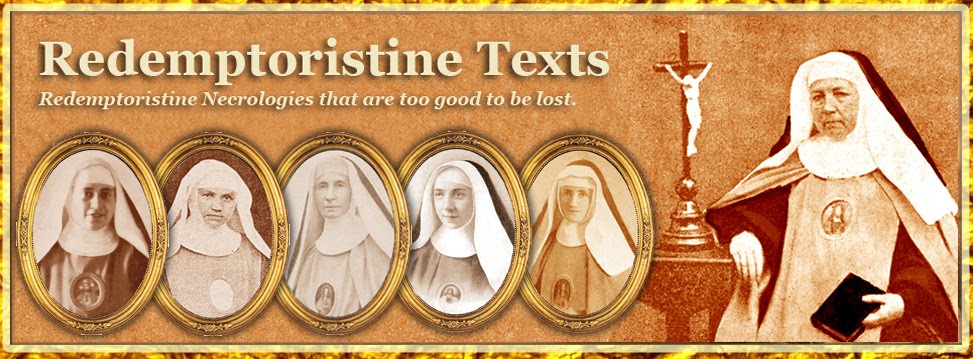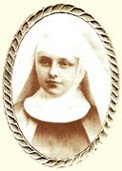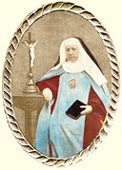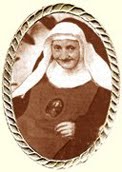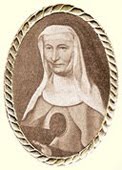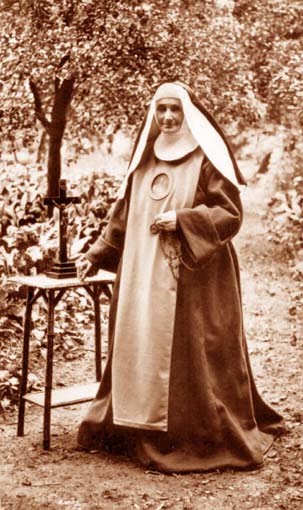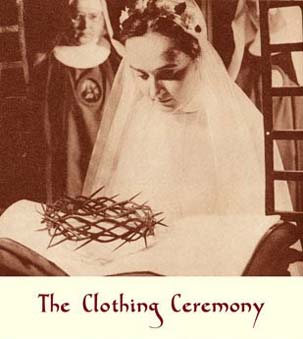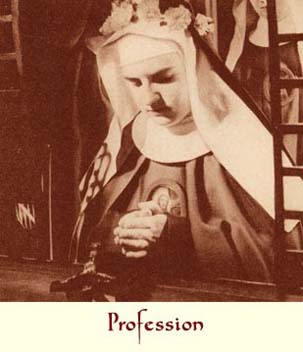Chapter II. The offices she exercised.
– She is named Superior. – Her virtues.
– She is named Superior. – Her virtues.
Our dear Sister Marie-Philomena spent another year in the novitiate, and when she finished it, she was made Mistress of Educandes. She devoted herself completely to the young souls that Heaven entrusted to her, and in spite of her numerous occupations, she formed them most carefully in religious life. Her examples, moreover, made an even greater impression than her words, and everyone admired her exactitude, her regularity, and her great courage in bearing all the privations imposed on her by poverty. The provisional convent was nothing more in fact than an old house that let the wind and the cold in through badly-fitting windows. Everyone froze beside the fire, and the Sisters had nothing that could guarantee them against the inclemency of the weather. The food was very meagre and little suited to a health like hers. But she was happy to suffer and encouraged her educandes to bear the same privations as joyfully as she did. She often worked far into the night, sometimes to bring order into the affairs of the house and examine the accounts for the new building, and sometimes to prepare the music necessary for the chanting of the sacred office or the flowers destined to adorn the holy altar. In spite of all this, she was the first one in choir in the morning for the canonical Hours.
On 23rd June 1845, the community moved to its new Monastery. Sister Marie-Philomena was then put in charge of the novitiate, which she directed until 11th August 1851, when she became the Vicar. Her zeal for observance had always been great, but now it redoubled. The Superior, because of her health, was not able to take part in the community acts, so our dear Mother Vicar seemed to multiply herself to preside at all of them, without harm to her occupations, and when Mons. Malou, seeing the community so numerous, expressed his desire for a foundation to be made at Brussels, our dear Mother, through her rare prudence, successfully sustained and defended the interests of the house of Bruges, without harm, however, to the first swarm which was to go forth from this blessed bee-hive. The unanimous voices of the Sisters, as well as the wishes of their Bishop, then called upon her to assume the burden of the Superiority. It was an even more heavy one at this moment, considering that with the financial concerns, the building of the convent, and the difficulties of a new foundation, it had never been possible to establish regular observance in all its vigour. It therefore required a rare prudence to set aside ancient customs dear to feeble souls and to moderate too great an ardour in some of the others. This is what our good Mother did. She soon managed to gain all hearts, and the holy Rule being observed with cheerfulness and fidelity, there soon reigned with it joy, fraternal union, silence, the love of mortification and prayer.
Mother Marie Philomena occupied herself actively in regulating the affairs of the Monastery, paid the debts, and by establishing order and economy everywhere, and practising holy poverty exactly, she attracted to that dear house all the divine, spiritual and temporal blessings.
It was at the price of prayers prolonged well into the night and great mortifications, that this good Mother thus obtained from Heaven everything which could contribute to the good fortune of her daughters. Always the first to give them their example, she also procured for them all their spiritual helps, which would assist them in travelling in the footsteps of our good Saviour, and she could in reality say with the Apostle: “Imitate me as I myself imitate Jesus Christ.”
Numerous vocations permitted her to found, in 1858, a house at Velp, in Holland. She led five Choir Sisters and two converse there, and after establishing the enclosure there, she returned to Bruges. In the following year, she conducted a new swarm to Ireland to begin a house in Dublin, and it was also at the cost of much suffering, great efforts and numerous sacrifices that she established this new foundation. Upon returning to Bruges, she continued to govern her community, making it continually progress in fervour and love of regularity, sparing nothing of whatever could contribute to the good of her daughters, and giving a good example in everything.
Her wisdom, her prudence and her gentle firmness gained hearts so securely for her that at each triennium, she received the votes unanimously, and she thus found herself obliged to remain in charge for the space of twenty four years, in other words, until her death. They were years full of fervour, suffering and merits for her, and good fortune and prosperity for the community.
The good God had already sent new vocations to replace those Sisters who left us for the foundations at Velp and Dublin, when a favourable occasion presented itself to establish a foundation at Louvain. Mons. Dechamps, then Archbishop of Malines, who knew and esteemed our dear Mother, joyfully granted her the necessary permissions. However, this foundation cost her a great deal of effort, as her health was already greatly altered. She conducted ten Sisters there on 25th July 1874. The good God paid her in the money with which He rewards his dearest friends – numerous crosses began to add brilliant pearls to her crown.
The living faith of our dear Mother made her see the hand of God directing every event. She was never heard to murmur or complain about whatever was causing her pain. “It is the good God who wishes it so,” she would say, “and we have to submit and wish for it also.” She had to support some great crosses – some very undiscerning people made false reports about her that brought her great humiliations and harsh reproaches from her superiors. She remained calm, persuaded that God would make the truth appear, and in fact, this is what happened, as the calumnies by which people wished to blacken her only served to increase the esteem which she already enjoyed among her superior authorities, and beginning with this moment, she was accorded an unlimited confidence, which she never abused. Some people to whom she had done some good manifested a profound ingratitude to her. Her good heart suffered greatly from it, but her living faith still let her discover the designs of God in it. She said, “The Lord has wished to purify whatever would have been too much of nature. – I would never have believed I would be paid like this for what I have done for N. and for N… It makes me suffer, but I thank Our Lord, for it is from Him that I await my recompense.”
Sometimes, however, the wounding of her heart bled more strongly. One day, when she appeared to be lost in thought, she was asked why she was so sad. She said, “I have examined myself and I am trying to work out if I have done anything to merit the reproaches and behaviour of such a person, but I can find nothing. And I wish her so much good! Yes, this detaches me from everything! How foolish we are if we do not act for God alone! If I had not done such and such a thing for Him, I would have had nothing.”
Her confidence in God always sustained her in the painful circumstances that she had to endure. From her childhood, through the misfortunes of her family and later on when she found herself at the head of her community, where almost everyone had to be formed, our dear Mother put all her trust in God. She rested on divine Providence, and her hope was not in vain. Under her wise direction, the community became a model of fervour, and the Lord poured out the most abundant blessings upon it.
Her love for God was also shown in her works; for never, in all her long religious career, did her fervour ever slacken. It was this love that inspired such ardour in her for the observance of the holy Rules and for the advancement of the souls that Jesus Christ had entrusted to her. She found her delights before the sacred tabernacle, but when her duties called her, it was her love of God that led her to leave God for God’s sake. It was the same love which caused her to love silence and solitude, which brought her to sacrifice herself and devote herself to her daughters, and impose very harsh penances upon herself for their sake. She even shortened her days by doing pious excesses of them, which she carefully kept hidden. The admission she let slip one day left her quite confused. “My God,” she said, “why did I say that? I didn’t want anyone to know about it.”
Our dear Mother was a model of charity towards her neighbour. She could not endure anyone going short. “You make me sad,” she would say, “when you wound charity; and this makes me tremble, because in afflicting the Heart of Jesus, you deprive the community of heavenly blessings.” Her joy, on the other hand, burst forth when she saw unity and charity reign. “Oh, how good this makes me feel!” she would say, “The good God will be pleased with us.” Her good heart never refused a service that she could render, and she suffered when this service was impossible for her. She was always ready to console her Sisters and help them, and she received them courteously and took care of them in their illness. So we had recourse to her with a filial confidence in our spiritual and bodily necessities, and we always found in her what we were looking for. We would always see her deprive herself, unknown to anyone and to comfort a tempted soul, of a warm and light garment that she considered was necessary for her.
She greatly loved the Divine Office, and she recited it and chanted it with such ardour and joy that she inspired the same in the Sisters, and she could not endure anyone being negligent in this holy exercise. She would say, “Just remember, we are now doing what we will be doing in all eternity.” We could see her hasten to arrive there among the first. “I assure you,” she would say, “that my greatest penance is not being able to be present in choir, and if I become feeble and incapable of assisting at the holy office, it would need God’s help for me to resign myself to it, as I do not know how I would make this great sacrifice.”
Her love for poverty made her fear everything that could damage this virtue, which had to be so dear to a daughter of Saint Alphonsus. She had nothing superfluous for her own use and she was happy when the good God permitted her to be forgotten. She complained only of the too great care that was taken of her. She never asked for anything; however, her always delicate health made her very sensitive to the changing of the seasons and to fatigue. Very often she would leave the table, having scarcely touched what was served up to her, as the feebleness of her stomach could bear scarcely any food.
In a word, this true daughter of Saint Alphonsus loved everything that our holy Founder himself loved. Her favourite devotions were devotion to the Blessed Sacrament, the Childhood and the Passion of our good Saviour; and these great mysteries were the continual object of her meditations. She had the same love for the Blessed Virgin as a child has for her mother; and she made a vow to recite the rosary daily, and she never omitted this pious exercise. She prayed a great deal for sinners. The souls in purgatory also excited her compassion. She applied to them all the indulgences that she could gain for them.
This is how our good Mother rapidly advanced in perfection, and her divine Spouse, who was pleased to see her thus united to Himself, also wished, towards the end of her life, to send her a very harsh cross, to complete her purification. She accepted it with great love and a perfect generosity.
This necrology is translated from Fleurs de l'Institut des Rédemptoristines by Mr John R. Bradbury. The copyright of this translation is the property of the Redemptoristine Nuns of Maitland, Australia. The integral version of the translated book will be posted here as the necrologies appear.
